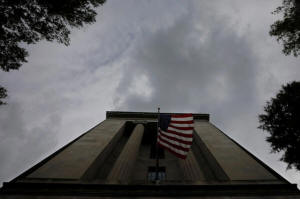|
Russian charged with conspiring to
interfere in U.S. congressional elections
 Send a link to a friend
Send a link to a friend
 [October 20, 2018]
By Nathan Layne [October 20, 2018]
By Nathan Layne
NEW YORK (Reuters) - The U.S. government on
Friday charged a Russian national with playing a key financial role in a
Kremlin-backed plan to conduct "information warfare" against the United
States, including ongoing attempts to influence next month's
congressional elections.
Elena Alekseevna Khusyaynova, 44, became the first person charged with a
crime for attempting to interfere in the 2018 U.S. midterm elections,
according to a government official with knowledge of the investigation.
Khusyaynova was the chief accountant for Project Lakhta, an operation
started in 2014 and financed by a Russian oligarch close to Russian
President Vladimir Putin and two companies he controls, according to a
criminal complaint.
The oligarch, Evgeny Viktorovich Prigozhin, and his two companies were
indicted in February in Special Counsel Robert Mueller's separate
investigation of alleged Russian meddling in the 2016 U.S. presidential
election to boost eventual winner Donald Trump over his Democratic
opponent, Hillary Clinton.

The case against Khusyaynova was unsealed on the same day that U.S. law
enforcement and intelligence agencies issued a warning about attempts by
Russia, China, Iran and other foreign entities to interfere with Nov. 6
congressional elections, in which Trump's Republicans are trying to
maintain majority power in Congress, and national elections in 2020.
The complaint detailed new examples of Russians using fake personas on
social media to stoke divisions over race, gun rights, voter fraud and
other contentious issues. Some messages targeted next month's elections,
indicating the operation has not been deterred by Mueller's indictments
earlier this year.
"This one shows that the threat from Russia is not over," said Barbara
McQuade, a former U.S. Attorney in Michigan. "This is a true propaganda
war."
Russia called the allegations an attempt by the United States to
fabricate a pretext to impose sanctions as part of a "disgraceful
slander campaign" against Moscow.
"Have been spreading impudent lies about the mythical 'hand of Moscow'
for more than two years - since the previous presidential election -
Washington is now trying to play the same card," Deputy Foreign Minister
Sergei Ryabkov said in a statement on Saturday.
"The United States clearly overestimates its own capabilities. By
demonstrating hostility toward Russia and a contemptuous attitude toward
the whole world, it will only be getting an increasingly strong
pushback," he added.
Using social media and other avenues, the Russians are waging
"information warfare against the United States," to sow distrust in the
political system, according to the complaint, which charged Khusyaynova
with conspiracy to defraud the United States.
The complaint included Facebook and Twitter posts that were both
critical of Republicans and supportive of President Donald Trump. One
post in March, for example, suggested Trump deserved the Nobel Peace
Prize for his negotiations with North Korean leader Kim Jong Un aimed at
denuclearization.
Trump, who at a news conference in Helsinki in July with Putin cast
doubt on his own intelligence agencies' findings that Russia had meddled
with the 2016 election, dismissed the latest charge against Russia as
unrelated to him.
"It had nothing to do with my campaign," Trump told reporters in
Scottsdale, Arizona. "If they are hackers, a lot of them probably like
Hillary Clinton better than me."
[to top of second column]
|

A U.S. flag flies at the headquarters of the Department of Justice
in Washington, U.S., August 3, 2018. REUTERS/Brian Snyder

NOT MUELLER'S CASE
The Khusyaynova case is being prosecuted by assistant U.S. attorneys
in the Eastern District of Virginia. It is not being handled by
Mueller because it touches on the 2018 elections, which is not part
of his remit, the government official said.
Khusyaynova oversaw the financial operations for the project, which
had a proposed budget of $35 million for January 2016 to June 2018
and used those funds to wage similar campaigns in the European Union
and Ukraine, in addition to the United States.
"It is a global campaign for a regime that views democracy as an
existential threat," said John Carlin, former U.S. Assistant
Attorney General for National Security.
Khusyaynova, who is a resident of St. Petersburg, Russia, and is not
in U.S. custody, billed Prigozhin and his companies to pay for
advertisements on Facebook, bloggers, and for "development accounts"
on Twitter, the complaint says.
Prigozhin has been dubbed "Putin's cook" by Russian media because
his catering business has organized banquets for the Russian leader
and other senior political figures. He has been hit with sanctions
by the U.S. government.
The criminal complaint said there was no evidence that Khusyaynova
or others in the conspiracy succeeded in impacting the outcome of
any U.S. election.
In their joint statement on Friday the Office of the Director of
National Intelligence, Justice Department, FBI and Department of
Homeland Security also said they did not have any evidence that
anyone went far enough to prevent voting or change vote counts. Some
state and local governments, which run polling sites, have reported
attempts to access their networks, but officials were able to
"prevent access or quickly mitigate these attempts," the statement
said.
Mueller's office has not announced any new indictments since July
when it charged 12 Russian intelligence officers who were accused of
hacking Democratic computer networks as part of Russian meddling in
the 2016 U.S. election.

Mueller has been widely expected to remain quiet in the run-up to
the November elections to avoid actions that might sway votes.
But the decision to unseal the Khusyaynova case now appears to
reflect changes to Justice Department guidelines last month
instructing U.S. attorneys to lean toward disclosing foreign
influence operations as a means of deterrence, Carlin said.
The Khusyaynova case shows "in detail that when we talk about
Russian interference it is not something in history it is now,"
Carlin said. "Making it public is an important way to neutralize
them."
See related Factbox
(Reporting by Lisa Lambert, Makini Brice, Mark Hosenball and
Jonathan Landay in Washington, and Nathan Layne in New York;
additional reporting by Polina Devitt in Moscow; editing by Bill
Trott and James Dalgleish)
[© 2018 Thomson Reuters. All rights
reserved.]
Copyright 2018 Reuters. All rights reserved. This material may not be published,
broadcast, rewritten or redistributed.
Thompson Reuters is solely responsible for this content. |